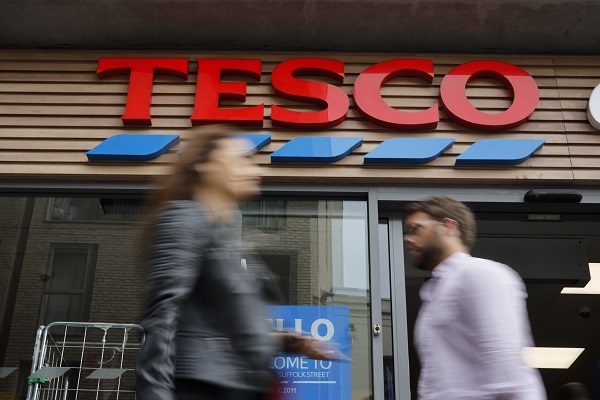ii view: Tesco profit upgrade follows bumper Christmas
The UK's biggest retailer enjoyed a buoyant 2023, but what will 2024 bring? We assess prospects.
11th January 2024 11:42
by Keith Bowman from interactive investor

Third-quarter and Christmas trading update for 19 weeks to 6 January
- Like-for-like UK and Irish sales excluding fuel up 6.9%
- Wholesale Booker sales up 4%
- Central European sales down 0.3%
Guidance:
- Now expects full-year adjusted retail operating profit of £2.75 billion, up from between £2.6 billion and £2.7 billion
Chief Executive Ken Murphy said:
"The Tesco team has worked harder than ever to help customers celebrate this Christmas, with our strongest ever range of great value, fantastic quality food. We put a strong focus on quality and innovation too, with over 550 new and improved festive products.
“Over the period we cut nearly 2,700 prices, with a further 150 prices cut just this week, cementing our position as the UK's cheapest full-line grocer. Our powerful combination of great value, quality, availability and service means that we head into the New Year in great shape to keep delivering for customers."
- Invest with ii: Open an ISA | ISA Investment Ideas | ISA Offers & Cashback
ii round-up:
Retailing titan Tesco (LSE:TSCO) today detailed sales which beat City estimates enabling it to raise its full-year profit expectation.
Like-for-like sales excluding fuel for its core UK and Irish businesses rose by 6.9% for the combined third quarter and Christmas trading periods, exceeding analyst estimates of 6.4%. As such, Tesco now expects adjusted retail operating profit for the full year to late February of £2.75 billion, up from its previous estimate of between £2.6 billion and £2.7 billion, although that's close to existing City forecasts.
Shares in the FTSE 100 company drifted marginally lower in UK trading having come into this latest news up by more than a quarter during 2023. That’s below a two-fifths increase for arch-rival Sainsbury (J) (LSE:SBRY) but comfortably ahead of a 3.8% increase for the FTSE 100 index itself.
Tesco flagged record sales in the weeks leading up to Christmas, with its UK market share in the four weeks to 24 December growing 0.15% to 27.9%. UK Clubcard sales penetration grew further year-over-year to 83%, with online sales climbing 11.5%, helped along by its relatively new fast delivery ‘Whoosh’ service.
Less favourably, sales for its wholesale Booker business missed City hopes, rising 4% for the combined periods compared to City estimates of 5%, while third-quarter Central European sales also retreated 1.4%, but then improved to a gain of 1.6% during Christmas trading.
Full-year operating profit hopes for its banking division remain unchanged at between £130 million and £160 million.
Broker Morgan Stanley reiterated its ‘overweight’ stance on the shares post the trading update with and estimated fair value target price of 320p per share. Annual results are scheduled for 10 April.
ii view:
Starting out as a market stall in 1919, Tesco today employs over 330,000 people across its stores and distribution centres in both the UK, Ireland, and Central Europe. In 2017, it purchased UK food wholesaling business Booker, giving it exposure to both restaurants and other food convenience stores and businesses. Competitors arguably include Marks & Spencer Group (LSE:MKS) and partner Ocado Group (LSE:OCDO), and budget retailer B&M European Value Retail SA (LSE:BME).
For investors, elevated borrowing costs now squeezing its consumer’s disposal income cannot be forgotten, and competitors including discounters Aldi and Lidi are not standing still. Cost pressures generally for businesses including wage demands persist, while foreign exchange moves can affect the numbers including a previous currency devaluation at its Hungarian business.
- Eight reasons for UK investors to be positive in 2024
- 37 growth stocks to own in 2024
- How to build a defensive portfolio in 2024 as recession risks loom
On the upside, Tesco’s UK market share remains solid at 27.9% according to marketing data and analytics company Kantar. Geographical and business type diversity exists given its wholesale Booker operation and banking businesses. Cost savings continue to be reinvested back into competitive shelf prices, while its long established loyalty Clubcard offers valuable customer insights.
For now, and while some caution looks sensible, Tesco's core business remains defensive. Combined with a forecast dividend yield of close to 4%, existing fans of the stock will likely sit tight, while Tesco might attract other investors seeking exposure to the sector.
Positives
- Robust UK market share
- Diversity of both business type and geographical region
Negatives
- Intense industry competition
- Uncertain economic outlook
The average rating of stock market analysts:
Buy
These articles are provided for information purposes only. Occasionally, an opinion about whether to buy or sell a specific investment may be provided by third parties. The content is not intended to be a personal recommendation to buy or sell any financial instrument or product, or to adopt any investment strategy as it is not provided based on an assessment of your investing knowledge and experience, your financial situation or your investment objectives. The value of your investments, and the income derived from them, may go down as well as up. You may not get back all the money that you invest. The investments referred to in this article may not be suitable for all investors, and if in doubt, an investor should seek advice from a qualified investment adviser.
Full performance can be found on the company or index summary page on the interactive investor website. Simply click on the company's or index name highlighted in the article.